Table of Contents
Overview | Types of Puppy Worms | Symptoms | Diagnosis | Treatment | Prevention | Humans and Puppy Worms | FAQ | Ask a Vet a Question | For Additional Reading
What You Need to Know About Puppy Worms:
Finding worms in puppy poop is a common problem with worms found in puppies 99% of the time. The most diagnosed puppy worm types are hookworms and roundworms. Puppies are often born with worms that are passed on from the mother before birth or through nursing. Worms can be dangerous and should trigger a trip to the veterinarian whenever they are suspected. Puppies should be dewormed at least two times, usually during their first and second visit to a vet or the first time they are vaccinated. This can occur as early as 2 weeks of age.
The companion animal parasite council recommends that puppies be tested for intestinal parasites at least 4x in the first year of life and 2x times per year in adults depending on health and lifecycle factors. The council also recommends that treatment with a dewormer start at 2 weeks of age and is repeated every 2 weeks until regular broad spectrum parasite control begins. A single worm does is not enough to eradicate the worms they have picked up from the mother.
Puppy worm related symptoms include poor coat condition and a loose stool. Some worms such as hookworms and roundworms can be passed to children and adults, making it even more important to seek prompt treatment. Diagnosis is based on an examination of the feces (bring a sample to the vet) or a blood test for heartworm. Once diagnosed, puppies will be receive a prescription dewormer followed by the suggested use of a preventative. Puppies are at greater risk from worms if the live in a kennel, breeding facility or shelter.
Overview
Intestinal worms are an extremely common problem in dogs, and are especially common and problematic in puppies. The main types of intestinal parasites seen in puppies are:
- Roundworms (Toxocara spp.)
- Hookworms (Ancylostoma and Uncinaria)
- Tapeworms (Dipylidium caninum)
- Whipworms (Trichuris vulpis)
Roundworms and hookworms can be transmitted to humans and, for this reason alone, dog owners should take intestinal parasites very seriously.
A stool sample is needed for diagnosis since worm eggs are not visible to the naked eye. Roundworms and tapeworms can be seen in the poop without the help of a microscope.
- Dog tapeworms: look like flat white rice kernels. They can be found in the feces or around the anus.
- Dog roundworms: these are 3 to 5 inches and are long, round, white and look like spaghetti. The can be found in puppy poop or in vomit.
There are also several types of non-intestinal worms that can infect dogs:
- Heartworm (Dirofilaria immitis)
- Subcutaneous worms (Diroflaria repens)
- Lungworm
- Eye worms (Thelazia callipaeda)
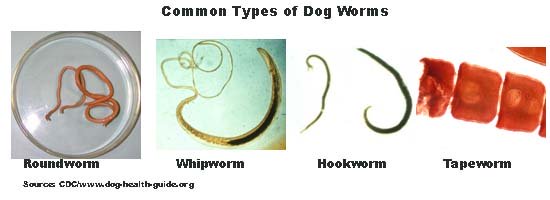
Many puppies are infected before birth and, despite attempted de-worming by breeders and shelters, they still are infected when they go home to their new families. It is important for every family taking in a new puppy to be aware of the dangers of intestinal parasites and to start appropriate monitoring and prevention of parasites right away with a trip to the veterinarian.
Many breeding kennels and animal shelters have rampant worm infestations, and despite efforts to disinfect the environment and de-worm the population, a majority of puppies that come out of some of these facilities are infected with worms when they go home to their new families. For this reason, make an appointment with your veterinarian as soon as possible after adopting or purchasing a new puppy, preferably the same day.
You should bring a fresh stool sample (deposited in the last 12 hours) with you to the appointment so that the vet can check for microscopic parasite eggs. If your dog does not provide you with a sample your vet may be able to obtain one during the appointment or may send you home with a container to bring back at a later time.
Types of Puppy Worms
Worms in the puppy stool can look different depending on the type of worm. Review each type below for specific descriptions and pictures of dog worms.
Heartworm (Dirofiliaria immitis)
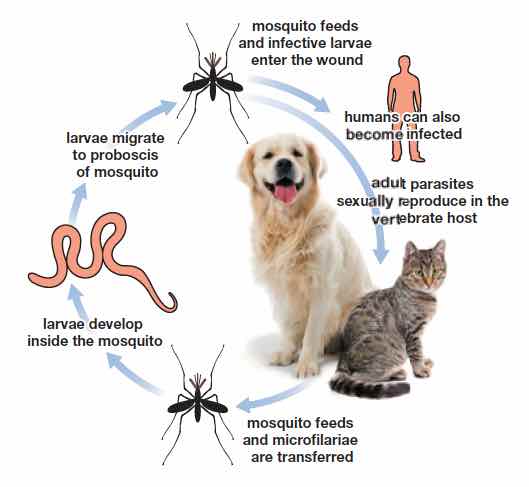
Heartworm is a worm that lives in the pulmonary artery. It is transmitted by mosquitos and can be passwed from a lactating mother to puppies. Worms can also pass through puppy skin. Infection can be fatal. Symptoms include:
- Weakness
- Dysponoea (Labored breathing)
- Chronic cough
Heartworm is controlled with the use of treatments that kill the juvenile heartworm prior to the worm migrating to the pulmonary artery and right side of the heart. Products do not stop infection, but keep the worm from developing into an adult that can then cause clinical symptoms.
Puppies need preventative heartworm treatment immediately as allowed (follow the manufacturers recommendation).
Hookworms
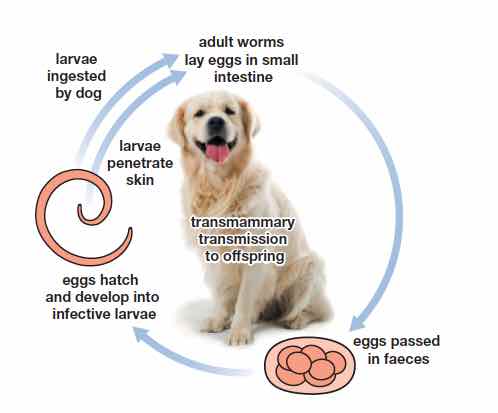
Hookworms are transmitted to the puppy if they ingest feces or if passed from the mother's uterus, or through mother's milk.
The worms attach themselves to the wall of the pups small intestine. The name hookworm comes from the mouthpart that is at an angle to the rest of the worm. The risk to the puppy is anemia since the worms suck blood while attached to the intestine and can cause death in young pups. Kennel runs can pass hookworms to a puppy.
Symptoms of puppy hookworm include:
- Diarrhea
- Weight loss
- Anemia
The condition is diagnosed when eggs are found in the feces. Diagnosis is challenging in young puppies since signs of disease can occur before infection is established via fecal examination.(1)
Treatment includes the use of an anthelmintic (dewormer) and supportive therapies.
Roundworms
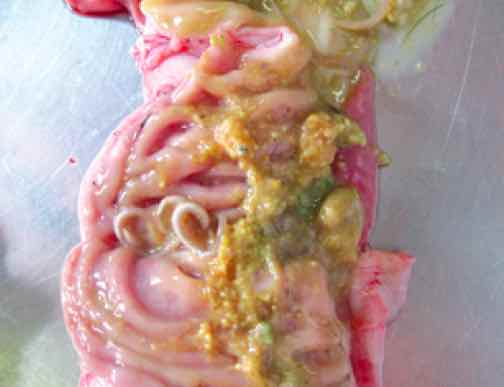
Many puppies are born with roundworm larvae in their tissues. The eggs are transmitted from mother's tissue to puppy (on the 42nd day of pregnancy) or when the puppy drinks milk from the mother. When the eggs hatch in the intestine they release larvae that penetrate the intestinal wall and then migrate. the life cycle is completed when the larvae are coughed up by the puppy and then swallowed again. Roundworms can grow to 5 inches long with one female producing 20,000 eggs per day. Eventually the worms start to release larvae as they attempt to infest the pups small intestine. The larvae can be found in the puppy stool. If ingested it can reinfest the puppy or other pets.
Roundworms have hard shells which enables them to live for years in the environment.
Puppies with roundworms have a protruded stomach and don't grow normally. Note that wormers do not prevent larvae from infesting the puppy. Dewormers only kill worms in the intestines.
Treatment:
From the age of 2 weeks, then every 14 days up to 2 weeks after weaning with fenbendazole/febantel, flubendazole, pyrantel or nitroscanate and then monthly treatments up to six months of age.
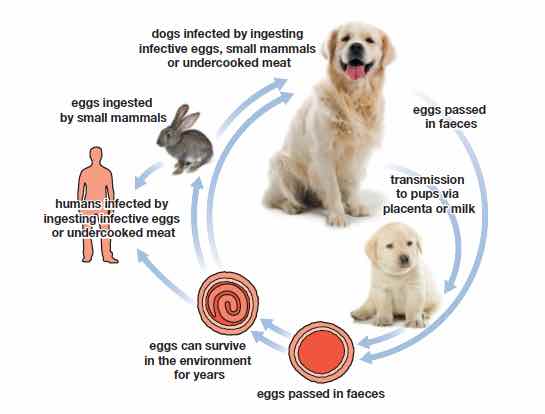
Source: European Scientific Counsel Companion Animal Parasites
Tapeworms
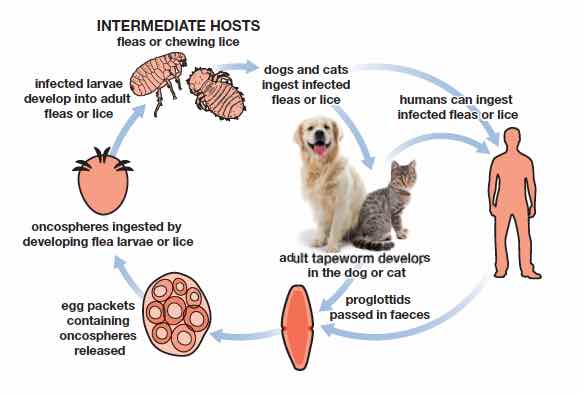
Tapeworms are passed to puppies by fleas. When the dog ingests a flea the tapeworm can developin the small intestine. The worms get their name by appearing to be made up of small segments which are attached together (up to 90, 4" to 6" length in total). These pieces can stick in the dog's fur or are found at the anus or tail. These segments appear to be grains of rice or flat white worms in the dog poop and can contain eggs. Tapeworms are not killed by wormers purchased without a prescription.
Tapeworms rarely lead to symptoms in dogs. It can cause irritation around the anus causing the dog to rub the anus along the floor.
Treatment:
Puppies should be treated after the presence of fleas is established. Treatment is performed with epsiprantel or praziquantel along with flea or lice control.
Whipworms
Whipworms live in the dog's large intestine (the cecum which is the first section) and have a threadlike appearance. These types of worms lay few eggs making them more difficult to detect in the puppy stool and diagnose. Eggs are passed in dog feces wth eggs developing in one to two months into worms. The eggs can survive in the environment for several years. After infection dogs can shed eggs for one year.
Symptoms include weight loss, stools that are covered in bloody mucous, and hyponatremai (ability to think, nausea, poor balance).
Whipworms in puppies are diagnosed when the "lemon-shaped" eggs are found in a fecal sample using the flotation technique.
Treatment involves frequent treatment and removal of the puppy from the contaminated area.
Symptoms (vary by type of puppy worm)
Worms such as roundworms, hookworms, and the protozoa coccidia are a danger to the puppy. Symptoms associated with puppy worm infestations include:
- Malnutrition
- Weight loss
- Poor hair/coat
- Loose stool or diarrhea
- Anemia
- Round belly (if they are full of worms)
- Pneumonia (in severe cases)
- Vomiting
Some puppies can have an infestation, but show no symptoms. The larvea (worm eggs) can stay dormant and then become active when a dog is stress. If a mother has hookworms or roundworms, during the end of pregnancy the worms can become active and then infest the puppy.
Diagnosis
Most types of worms can be determined with a fecal exam using the flotation technique. Heartworm and subcutaneous worms require a blood test. Feces should be examined at every annual checkup and when a puppy is first brought to a vet. You can see roundworms and tapeworms with the naked eye. Hookworms and other parasites require examination with a microscope.
Hookworm and whipworm eggs are easily recognized by a veterinarian.
Treatment
If parasite eggs or worms in puppy poop are found, your vet will prescribe an appropriate de-wormer and follow up with repeat fecal examinations until the stool is clear. Your puppy should also be started on a monthly heartworm preventive such as Trifexis®, Sentinel®, or Interceptor®. These products not only protect your dog against heartworm disease, but also prevent future intestinal parasite infection. For added support of the pups natural immune system defenses, you can also consider the use of a natural homeopathic formulated for this purpose such as Parasite Dr.
Treatment and the prescribed dewormer depends on the type of worm found. There is no single product that kills all worms. Some non-prescription wormers are not effective. Discuss what is best for your puppy with your veterinarian.
If you have other dogs in the house, your veterinarian will probably want to either check the other dogs’ stool samples or just go ahead and de-worm each dog. There is no need to isolate the infected dog, but do make sure to pick up any feces deposited by the dog right away, and you may want to bleach the spot in the grass just to be on the safe side.
Worms often live in areas where animals poop. Because of this it's a smart idea for dog owners to remove any feces found in the yard or other living areas.
Prevention
Prevent your puppy from eating feces. Remove any feces before it can come in contact with your dog. Only use deworms prescribed by your veterinarian.
Puppy Worms and Humans
If your vet finds signs of worms in puppy poop, appropriate measures should also be taken to reduce the possibility of transmission to a house mate or family member. Use good hygiene practices around the dog - always wash your hands after handling the dog or its feces, do not kiss the dog or allow the dog to lick you in the face, and do not sleep with the dog in your bed. Instruct children on how to follow these hygiene basics. For small children and babies, it may be best to keep them away from the puppy altogether until the puppy’s stool is clear. If children are helping in the garden, ask them to wear gloves (and shoes) as a precaution. They should not have any exposed cuts or scrapes as well.
FAQ
How long do dog deworming treatments take to work?
Dog deworming treatments work quickly in around 2 to 6 hours after administering the dewormer.
How long will my puppy poop worms after deworming?
It takes a puppy 1 to 2 weeks to get rid of worms after treatment begins. A puppy should be retreated if eggs are still present on the fecal exam or if vomiting persists.
Will You See Live Worms After Puppy Deworming?
After deworming it is normal for a dog to pass out dead worms or worms that show a slight movement such as a flicking motion. These worms will go on to die.(2)
For Additional Reading
Worm control in puppies and dogs.
Have A Dog Worm or Parasite Question For Our Vet? We Will Answer It For Free!
Do you have a Dog Worm or Parasite related Question for our Editors or a Helpful Story to Share? Please include information such as age, sex, breed, medical history, medications your dog is taking, recent changes in behavior, etc. Pictures are also helpful in identifying the severity and cause of any worm or parasite related problems.
We will do our best to get back to you quickly (depends on how many questions we receive each day). If you do require an immediate response we suggest using this online dog veterinary service that is available now.
References
(1) European Scientific Counsel Companion Animal Parasites
(2) My Pet & I - What to expect after deworming your dog
(3) Deworming dogs
(4) Washington State University
(5) AVMA
